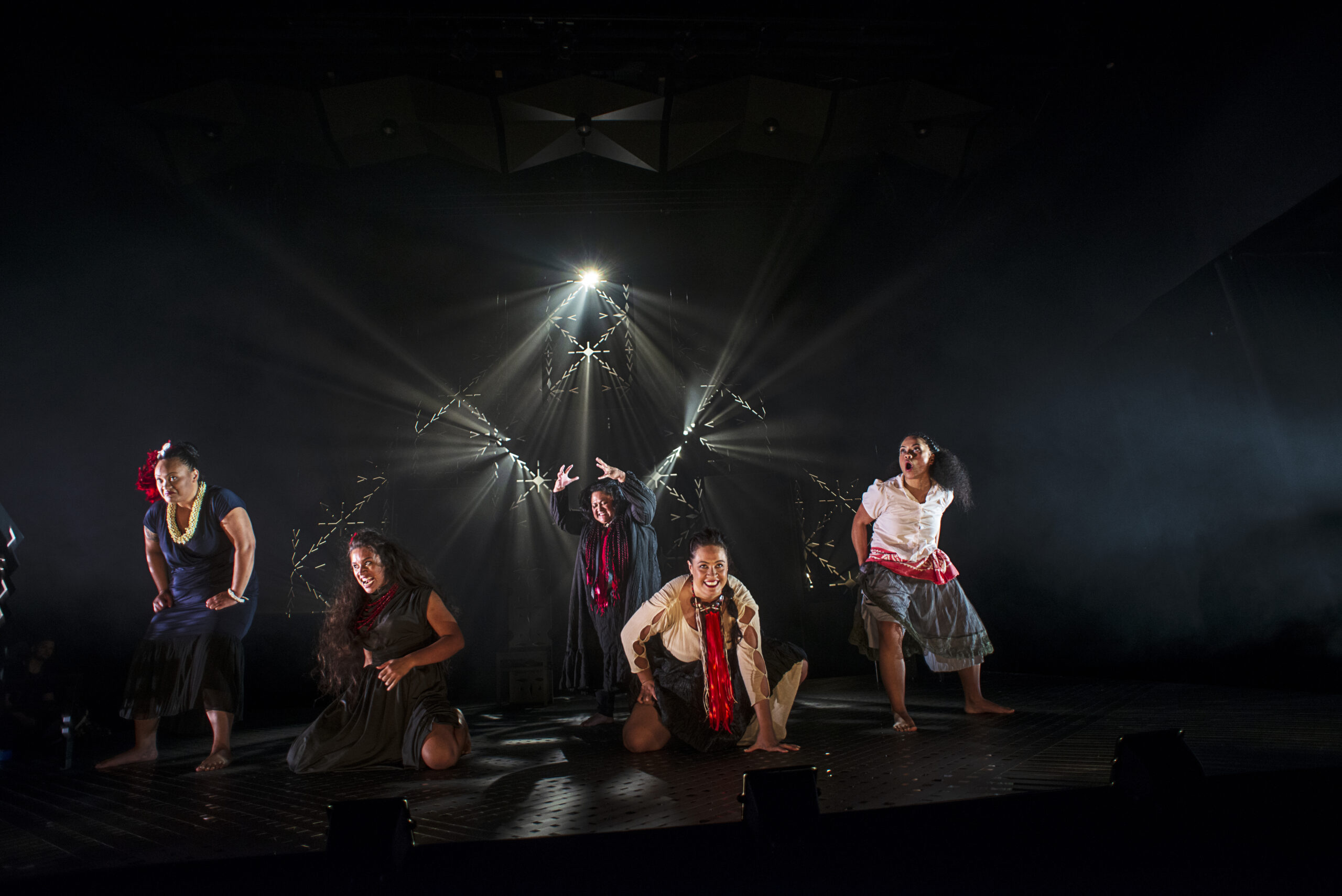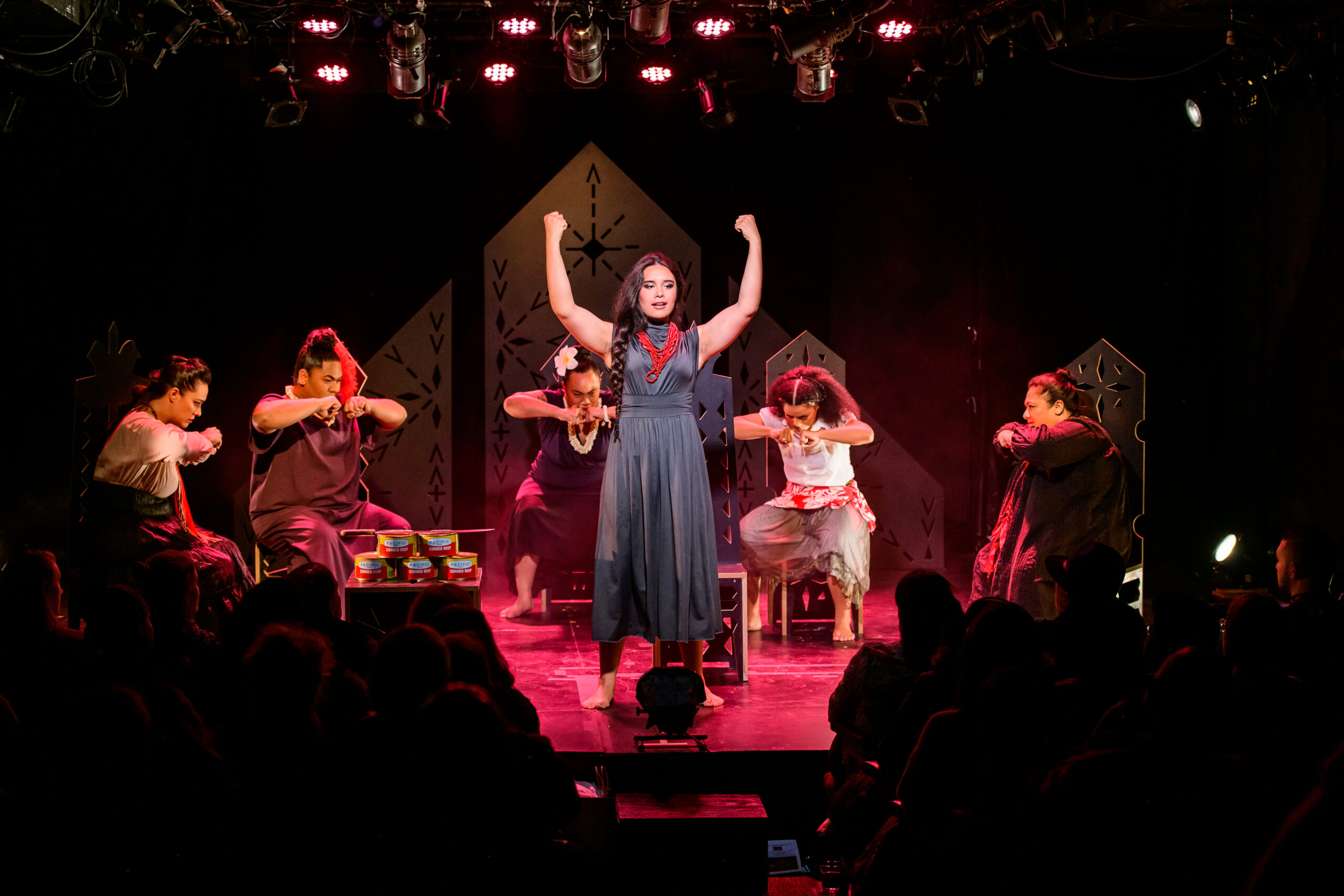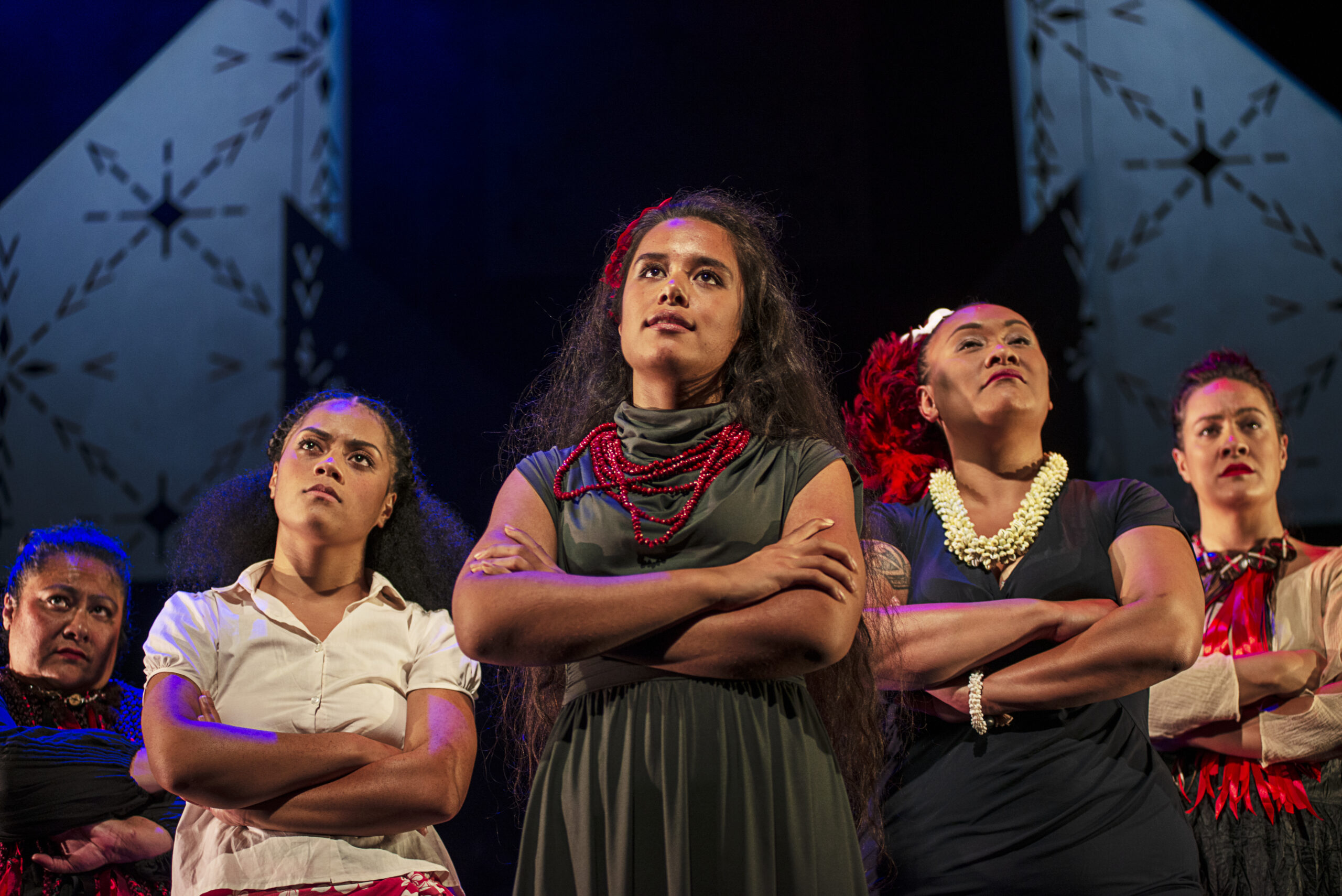Merrigong Theatre Company is thrilled to present one of New Zealand’s most successful theatrical exports, Tustiata Avia’s Wild Dogs Under My Skirt at the Illawarra Performing Arts Centre from the 10th to 13th April.
Adapted by Tusiata Avia’s poetry collection, Wild Dogs Under My Skirt is a provocative and unapologetic examination and celebration of what it is to be a Samoan woman. In the wake of the unending colonial earthquake, five Samoan characters make their lives between two cultures: playing, gossiping, enduring, enforcing the patriarchal status quo, and carving out powerful new identities.
I was incredibly lucky to have had a conversation with talented actress and stage performer Stacey Leilua about all things ‘Wild Dogs Under My Skirt’ – from all about her role in the performance and her journey with the theatre production, to the plays hugely successful 2020 run in New York City.
CAMERON: Could you give me a general synopsis of the show?
STACEY: Yeah, so the show is a collection of poems, so it doesn’t really follow a narrative per-say (like beginning, middle, end). It’s a collection that sits as a body of work centering around the female experience in the Samoan and Afakasi – which is half-caste Samoan context – and within that, the themes that are explored. Its everything from: love, and relationships – to sexual abuse, there’s incest. It’s really at times quite heavy, but it doesn’t ever shy away from encompassing the whole experience of what it is to be a woman from Tusiata’s point of view.
CAMERON: I want to get a little bit of an idea of what your role in the show is. What should audiences expect from your character, and maybe a little about the other characters too?
STACEY: Sure. So, for this season we’re five (performers) on stage. I am playing Tusiata herself, so it’s the ‘autobiographical character’, you could say, based off of Tusiata Avia, who is our writer. She struggles at times with a few identity issues, is well travelled – so she is worldly. She does belong to the Palagi world. She’s educated, she’s smart – but she also has times of being quiet vulnerable, in the Samoan context of where she sits. So surrounding Tusiata, we have a range of characters: from a 10-year Samoan girl living with her extended family and the village in Samoa. We have aunty-type characters who can be authoritarian at times and cruel – but they also uphold those traditional values. We go explore and we see a Russian dancer, we hear about Tusiata’s travels – falling in love with a Muslim man. We get to meet a typical dusky maiden character. So it’s really exploring all sorts of different facets and identities of the Samoan women.
“The response that we get from audiences is very honest.”
CAMERON: I’m assuming since you mentioned a couple topics earlier regarding incest and abuse, I’m assuming it’s rather provocative: there’s high high’s and low low’s?
STACEY: Yes. I would definitely say that it can be very confronting at times. It has been in previous seasons. The audience reaction that we get from performing (Wild Dogs Under My Skirt), as an actor whose been doing theatre for over 20 years – it’s quite a unique reaction we get from audiences because it’s a work that really does reach far and wide even though the context is within Samoan and half-caste culture. There are many themes about love and jealousy, marriage, relationships, childbirth and pregnancy, and all these things are relatable to everyone. The response that we get from audiences is very honest. We’ve had people coming up to use after the show and being moved to tears, some can’t even speak, because it’s highlighting things in their own lives – or experiences that they haven’t quite been able to sort of articulate, whether that be in a Samoan context or out of it. It’s through Tusiata’s writing that brings it out. It’s been a really special experience.
CAMERON: I’m assuming it would be a very vulnerable experience seeing how all these people respond.
STACEY: Yeah. You know, it’s been such an honour. I’ve been apart of the show since 2016, and before that – Tusiata performed the show as a one-woman show in the early 2000’s. So, it’s a work that has stood the test of time. It’s travelled around the world with Tusiata and then recently, we took the show to New York, and just being able to gauge the different audience on the other side of the world and seeing the same sorts of responses. It’s really affirming. Its reminding ourselves as actors, that we are the mouthpieces for her work. So being able to bring that message to the audience and then also being on the receiving end of the responses in real time – it is quite moving. There’s vulnerability, but also a sort of comfort and shared, recognised experiences and understanding of “Yep. You’re crying right now, and I know WHY you’re crying, because I TOO have also cried about the words in these poems.”
“I’m not a spiritual person, but I always say the closest that I feel to a spiritual experience – is being on stage with this show.”

CAMERON: You’ve been a part of (Wild Dogs Under My Skirt) productions from 2016-2020, and you’ve performed not only at the New Zealand Festival of Arts and the Auckland Arts Festival, but you’ve also had a two-week run at New York City’s ‘So-Ho Playhouse’. What’s been your favourite part of your journey with this show in general; from its conception – your first performance to now.
STACEY: I always come back to the cast, and these are relationships that have grown and transformed throughout all the years of performing the show, and it’s something really beautiful about having that experience with fellow actors who have, now become family really. It feels like a sisterhood. And when we are exploring these themes and under Anapela’s direction, which is masterful. I’m not a spiritual person, but I always say the closest that I feel to a spiritual experience – is being on stage with this show and really through the words of your understanding of our Samoan traditions and gods and goddesses. It’s like channelling that through performance and then giving it back out to the audience – it’s a really beautiful thing. I don’t particularly have a word for that specific experience. That kind of journey that we’ve gone on together as cast – being able to share this work with audiences – that’s the special part of it for me.
CAMERON: It’s like there’s a tight invisible bond between all of you guys that has only grown larger?
STACEY: Definitely
“The Soho season was, was actually a competition of the best Fringe shows around the world. I think it was something like twelve shows as a part of it, and ‘Wild Dogs’, we won that.”
CAMERON: How impactful has it felt to be able to perform this show and tell these stories to such a diverse audience; especially when you’re overseas in New York – far away from where the play was origination?
STACEY: The beautiful thing about taking a show like ‘Wild Dogs’ overseas all the way to New York was that we had our pacific communities who had, obviously travelled far from home many years ago, travelling over to New York to watch the show. I remember performing, and you’d come our afterwards and meet the audience, and they’d say “Oh, we just flew from L.A.” or “We just flew from San Francisco.”. And then, when you actually look into how far is it’, because in New Zealand, you could do the whole country in one day if you actually had to. Knowing that people were travelling so far for hours and hours to New York to watch the show, I was like “WOW”. That was a huge thing for me. I thought maybe these audiences were so hungry for work like this, and it was really a reaffirming thing. Our stories are being carried all across the world, and what the Soho season was, was actually a competition of the best Fringe shows around the world. I think it was something like twelve shows as a part of it, and ‘Wild Dogs’, we won that. To be a part of that and say ‘this is the best of the best’. It was really affirming as a Samoan female practitioner all the way from New Zealand – to be on that stage in New York and going “Yep. Here we are. These are our stories by our Samoan writer, directed by a Samoan female, and we’re winning these things.” It was pretty cool.
CAMERON: That must’ve felt really huge.
STACEY: It was really huge. We did it in January 2020 – so then we had won the competition and they had said “as your prize, we’re gonna sort out a return season. You’re gonna come back and it’ll be off-broadway.” And then COVID hit, and so nothing ever happened.
CAMERON: Yeah, I saw that. COVID must’ve been a huge impact to not only you – but also the show in general.
STACEY: Yeah well, that’s part of the reason why it just stopped in its tracks. We were on this trajectory of doing around New Zealand successfully, and then off to New York. It felt like that was the leap pad to then go further afield and then it was stopped in its tracks by COVID. We haven’t done the show in four years. We’re about to go into rehearsals next week, and I’m excited to see where the work is sitting because we’re all four years older with the life experience and everything. It’ll be good to get into rehearsals and just bring the work back.
CAMERON: So, this IS your first time in four years returning to these roles and these stories since COVID hit?
STACEY: Pretty much. After we did New York, we came back to New Zealand and then we did three performances at the Hamilton Garden Festival – which if you don’t know where Hamilton is – it’s about an hour out of Auckland and it’s a rather small town. So, it’s quite funny that we went from, “Oh we were off-broadway” and then we went to Hamilton. That was the last time we did the show, and I believe that was March 2020.
CAMERON: I just want to go back on something you mentioned – how you had people coming from San Francisco, and all those different parts of America. Do you think there was a sense of reaffirming that the stories that you’re telling are so universal?
STACEY: Definitely, and these were specifically our pacific audiences – a lot of our pacific communities migrated from this part of the world, going over to the states. Largely, the communities were sort of west coast – so a lot of these people were coming to New York on the east coast. But in terms of the New York audiences – it was so diverse and touching on these themes: they’re universal themes. So, we’re meeting these characters, and yes, they’re specifically Samoan, but the things they’re talking about are stuff that everyone goes “I know about that”, so it’s definitely a show that does touch a lot of people from all walks of life – all ages and ethnicities. Which is the beauty of it, and the reason why it has gone on for so long. It doesn’t date.
“Its most poignant when it’s speaking to your personal experiences and you can see yourself reflected on the stage, and that beautiful. That’s why we do it.”
CAMERON: Now the shows – clearly an ode and a love-letter to the stories of Samoan women’s culture, traditions and personal identities. As not only a performer, but also as someone with Samoan and Māori heritage, how crucial do you find it to have plays telling and representing these stories?
STACEY: The thing I love about wild dogs specifically speaking as an Afakasi woman myself, and this was something I didn’t quite realise until we got well into it because I was so used to playing a role that was Samoan in other plays or screen – the realisation that this was the very first time that I had actually played an Afakasi role. That, obviously, was based off of Tusiata, and there’s something to be said for that specific experience. That was something that always has stayed with me. It’s not just this sort of, in the past if it had been (kind of roles) it’d be a general thing, but its not really touching on specifics which I thought was kind of groundbreaking in a lot of ways. Being apart of those cultures myself, and Tusiata herself is not Māori – but she’s Palagi and Samoan, as am I – there’s so many references to things in the poems that I go “Oh god, I know exactly! I know that feeling!” She quotes talking about her size eleven Samoan feet, the fact that her Palagi friends stood to her shoulders, and all these things. I’m just going, “Oh my god.” It’s like you’re reading these poems and you’re going, “this is also my life” and you can’t help but think “well I’m putting this out there and I guarantee there’s people out there who are looking at this and are thinking “yes! this is me. This is me.” Its most poignant when it’s speaking to your personal experiences and you can see yourself reflected on the stage, and that beautiful. That’s why we do it.
“You can come in with nothing but an expectation that you’re gonna see a great show and I think you’re gonna leave hopefully feeling that you have been seen and parts of your life and your experiences.”
CAMERON: In regard to your performance coming to Wollongong – what’s something that you would like for audiences to go in and/or leave the show taking away from ‘Wild Dogs Under My Skirt’?
STACEY: I think – you can come in with nothing but an expectation that you’re gonna see a great show and I think you’re gonna leave hopefully feeling that you have been seen and parts of your life and your experiences. Whether you’re a woman or not, you’re seeing yourself on stage, and I’ll like to think people are going away and taking these beautiful. Beautiful words – that are sometimes tragic and that’ll really hit the nail on the head of something that you may have been unable to articulate in yourself – even possibly you’re whole life. Being able to take something away and go, “these people see me, and they understand I’ve been through – whatever that may be.” Thats what I think should be taken away. Come to it knowing that you’re going to a great show.
CAMERON: Any final words or statements you’d like to make for the audience?
STACEY: We’re really excited to come to Australia. The Australian audiences is very similar in alot of ways to a New Zealand audience, and we know how much New Zealand Audiences have loved the show and responded to it in such a really heartfelt way – so I’m excited for Australian audiences to hopefully have the same reaction. We can’t wait to get into rehearsals next, get over there and see everyone.

Support Wild Dogs Under My Skirt performing at Merrigong from 10-13 April – buy tix here.
Images: provided
This interview has been edited for brevity and clarity purposes




